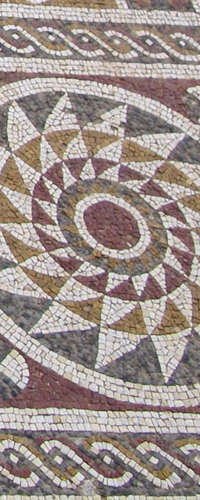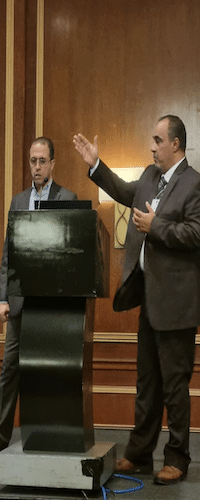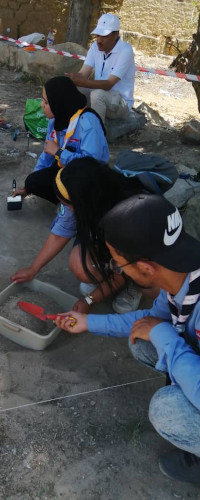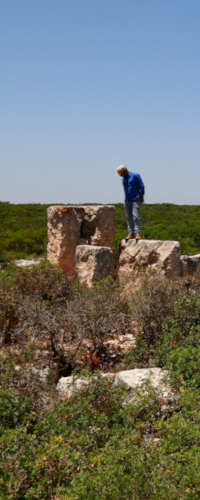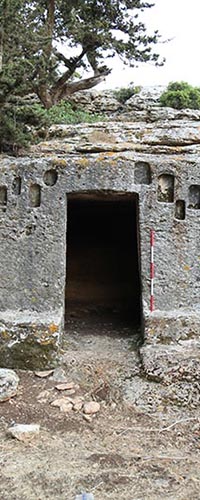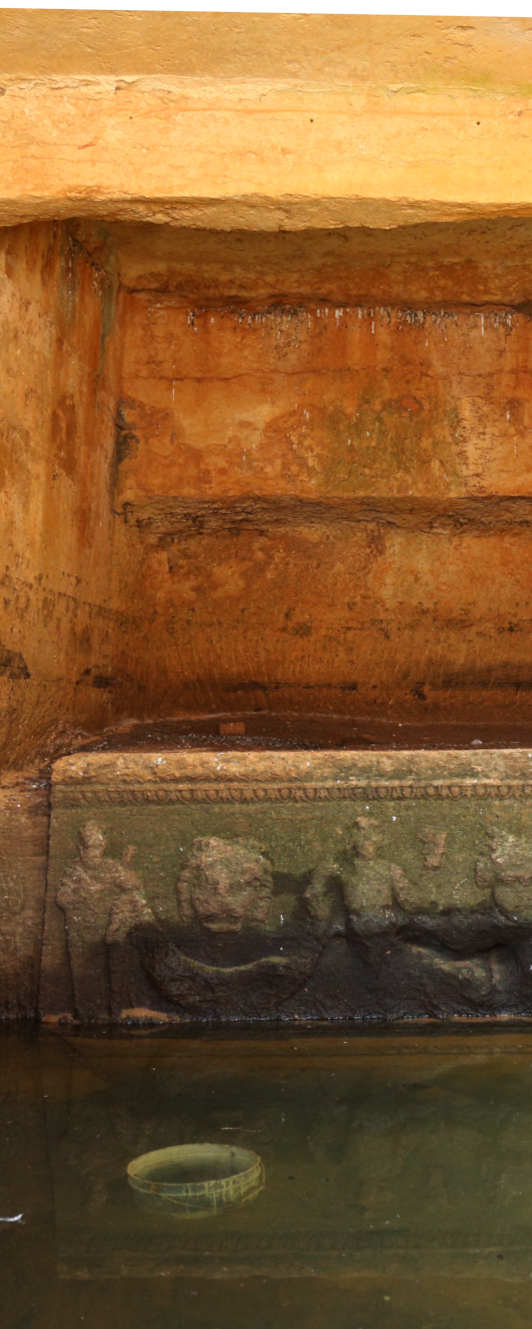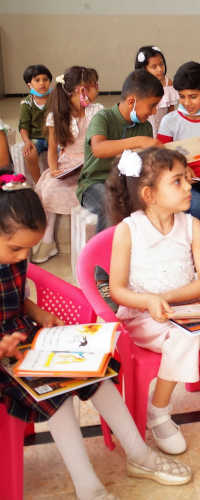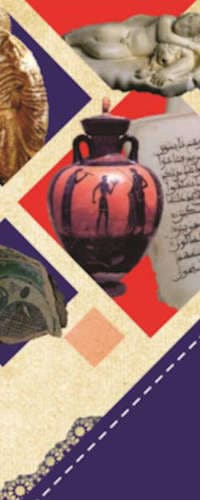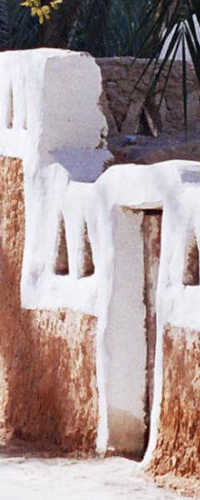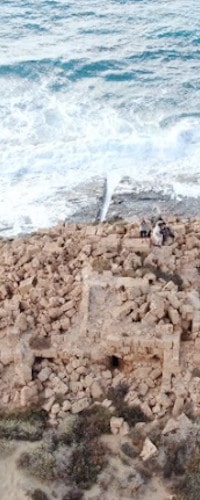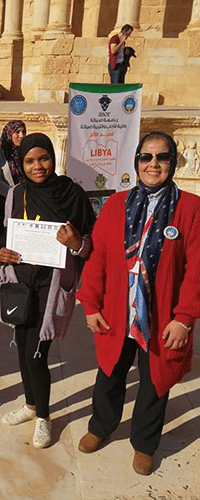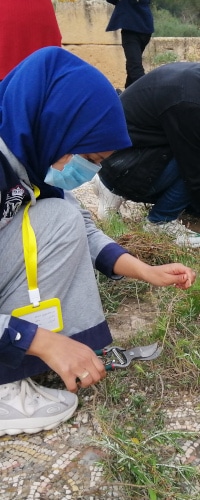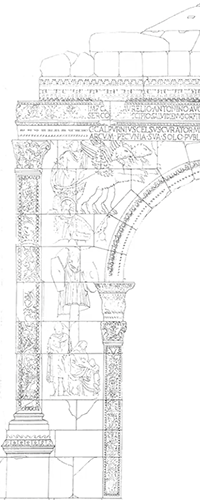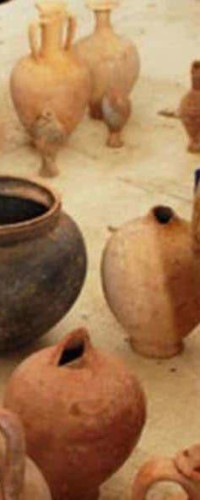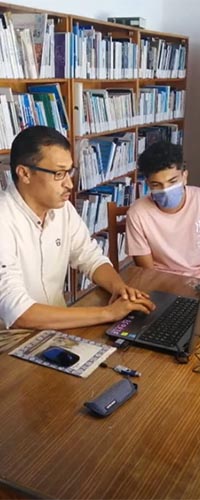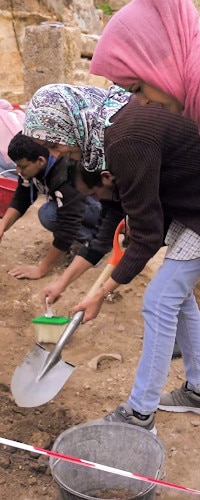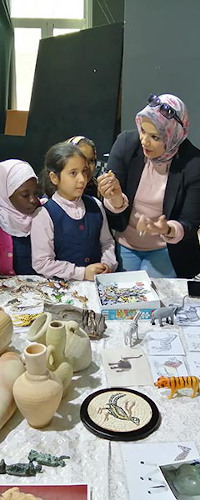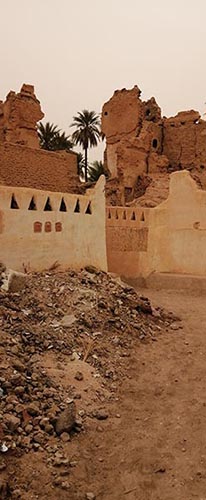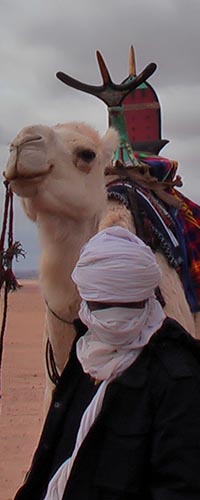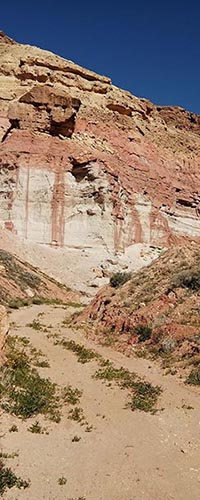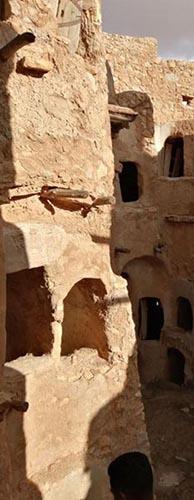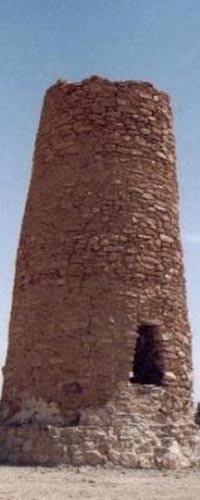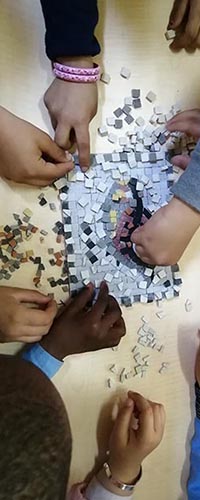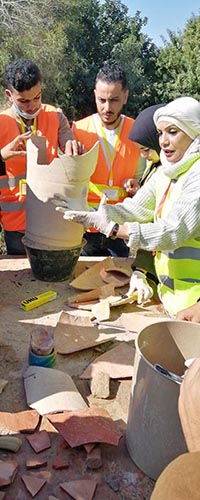
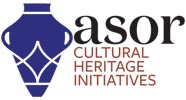
LIBYA UPDATES
ASOR CHI Symposium | Cultural Heritage Initiatives in Africa Today
On April 11-13, ASOR CHI hosted a three-day symposium, Cultural Heritages Initiatives in Africa Today, which highlighted the work of local heritage professionals, academics, and civil society organizations to protect, preserve, and promote cultural heritage in North Africa and the Sahel. ASOR welcomes you to view the symposium recordings.
UPDATE: Cultural Property Agreement Implementation Grant (CPAIG) Mini-Grants Program in Libya: Ghat Women’s Union
With support from a grant from the Public Affairs Section of the U.S. Embassy to Libya, the Ghat Women’s Union, a civil society association active in southwestern Libya, was able to restore a mudbrick building in the ancient public market and reanimate it as a public museum.
UPDATE: ASOR CHI AM22 Presentations about Cultural Heritage in Libya
With support from a grant from the Public Affairs Section of the U.S. Embassy to Libya, eight Libyan colleagues participated in the in-person ASOR Annual Meeting in Boston (November 16-19, 2022). They also presented their research in the virtual meeting in October. The meeting provided a global forum for people to learn about the work of our colleagues and exchange ideas on best practices in cultural heritage stewardship.
UPDATE: Oudna, Tunisia Workshop
On May 20-22, ASOR partnered with Libyan Department of Antiquities, the Libyan Museum Suitcase team, the Tunisian Institute national du patrimoine, and the Tunisian Scouts to hold a three-day workshop at the archaeological site of Oudna in Tunisia. This outreach event focused on the protection of cultural heritage in Libya and the Maghreb. The workshop was sponsored by the U.S. Embassy to Libya, External Office (LEO), and it was organized by ASOR and the Tunisian Scouts within the framework of a Cultural Property Agreement Implementation Grant (CPAIG). Additional support was provided by the U.S. Embassy to Tunisia.
UPDATE: Week 4—Protecting the Cultural Heritage of Cyrene, Libya
During the last week, the condition of 3 main sites located at the area of al-Qubba and Lamluda were evaluated. This week was distinguished by two things: First, Dr. Ahmed Hussein, head of the Department of Antiquities in the East, accompanied us to the site of Ain al-Qubba and met there with some officials from the city and talked with them about the readiness of the DoA to help protect and preserve the site of Ain al-Qubba.
UPDATE: Week 3—Protecting the Cultural Heritage of Cyrene, Libya
During Week 3 of the survey to document and assess threats to the cultural heritage of Cyrene, the team recorded 17 major sites from fortified agricultural settlements to rock-cut chamber tombs, as well as instances of destruction and threats to these sites. The local communities have been extremely helpful in assisting the survey team in documenting these sites.
UPDATE: Week 2—Protecting the Cultural Heritage of Cyrene, Libya
The second week of the Cyrene-al-Qubba risk assessment project was conducted between Saturday, July 3 and Thursday, July 8.
During this period, some 23 main sites and a number of subsites were visited, documented, and assessed, some of which have never been documented previously. We primarily documented agricultural and industrial settlements associated with cemeteries of various kinds. Some sites also contained defensive buildings such as towers as well as fortified farm buildings. The oldest of these sites date back to the Hellenistic period, the later Turkish, and more recent Italian periods.
UPDATE: Protecting cultural heritage around the UNESCO World Heritage site of Cyrene
This project, funded by the US State Department’s Ambassadors Fund for Cultural Preservation has two aims:
- to conduct damage and risk assessment work in an area surrounding the UNESCO World Heritage site of Cyrene with teams composed of Department of Antiquities archaeologists and Tourist Police and Antiquities Protection Authority personnel;
- to conduct heritage awareness workshops and events for the residents of the Cyrenaica with an emphasis on outreach to local youth
UPDATE: Libyan Update from the VAM: Cultural Heritage Partnership in Libya
ASOR Cultural Heritage Initiatives has been active in Libya since 2017, partnering with the Libyan Department of Antiquities, the Historic Cities Authority, the Boy Scouts and Girl Guides, and the Ghadames Manuscripts Association to document and preserve heritage sites as well as engage Libyan volunteers to protect cultural heritage around the country…READ MORE
UPDATE: Commonly Looted Items from Libya Booklet
With support from the U.S. Embassy Libya External Office (LEO), this booklet provides a listing of the ancient Libyan artifacts including the commonly looted items from Libya. It is a tool that can assist law enforcement authorities, such as tourist police and customs, to fight against illicit trafficking of cultural property. This booklet was overseen by Dr. Khlaled El Haddar and represents his work. It includes contributions from Ramadan al-Shaibani and editing from Dr. Ahmad Emrage and Talal
Click here to read the booklet
Click here for the Arabic version (الانطباع الأول عن عمل ميداني لطلاب اَثار في قورينا)
UPDATE from the VAM: Digitizing Manuscripts from the Trans Saharan Trade in Ghadames, Libya
Ghadames is one of the five UNESCO World Heritage sites in Libya. Its mud brick architecture is outstanding, but just as remarkable are the collections that have long been sheltered there. The Ghadames Manuscripts Association has been working to digitize and preserve a repository of manuscripts documenting hundreds of years of the trans Saharan trade stretching from the Libyan coast towards the Niger River valley. These efforts have recently expanded as new techniques of digitization and data management have been adopted in partnership with ASOR and Hill Museum and Manuscript Library.
UPDATE from the VAM: Archaeological Sites in Cyrenaica at Risk
Dr. Ahmad Emrage of the University of Benghazi, discusses threats facing rural sites in the region of Cyrenaica, ranging from agricultural activity to urban encroachment to looting and vandalism. Thanks to the U.S. Embassy Libya External Office (LEO), ten of ASOR’s colleagues from Libya were able to take part in ASOR’s Virtual Annual Meeting.
UPDATE from the VAM: Role of Departments of Archaeology
Mrs. Mofeda Mohammed Kreidigh of Sabratha University, discusses the role of university archaeology departments in protecting cultural heritage. The paper showcases teaching strategies both within and outside of the classroom, and details the current activities of university archaeology departments. Thanks to the U.S. Embassy Libya External Office (LEO), ten of ASOR’s colleagues from Libya were able to take part in ASOR’s Virtual Annual Meeting.
UPDATE from the VAM: Encouraging Volunteer Participation
Thanks to the U.S. Embassy Libya External Office (LEO), ten of ASOR’s colleagues from Libya were able to take part in ASOR’s Virtual Annual Meeting. Mr. Talal Bariun of ASOR presented the paper “Encouraging Volunteer Participation in Cultural Heritage Protection,” which discusses efforts to encourage volunteerism during weekend cultural heritage “pop-up” events.
UPDATE from the VAM: Authentic Orchestrations & Orchestrated Authenticity
Thanks to the U.S. Embassy Libya External Office (LEO), ten of ASOR’s colleagues from Libya were able to take part in ASOR’s Virtual Annual Meeting. Reem Furjani of SCENE presented the paper “Authentic Orchestrations and Orchestrating Authenticity.” Furjani’s paper looks at the changing use of space and the creation of heritage during the restoration of the Arch of Marcus Aurelius in Tripoli.
Report: The State of Illicit Trade and Looting Of Libyan Antiquities: 2011–2020
Encouraged by the U.S. Embassy to Libya External Office (LEO), ASOR embarked on this report in order to provide a record of materials documented as stolen since the outbreak of the Revolution in 2011. The goal is (1) to identify patterns in the illicit excavation and antiquities trade that continue despite the efforts of local authorities, and (2) to identify ways in which additional efforts and resources (by both Libyan authorities and by international partners) might prevent and counter this trade.
Click here for the Arabic version (الانطباع الأول عن عمل ميداني لطلاب اَثار في قورينا)
UPDATE: VAM20 Presentations About Libyan Archaeology & Cultural Heritage
With support from the U.S. Embassy Libya External Office (LEO), ten of ASOR’s Libyan colleagues took part in the 2020 Virtual Annual Meeting in November. The meeting provided a forum for people from 39 countries spanning six continents to hear about the work of our Libyan colleagues and exchange ideas on best practices in cultural heritage stewardship.
UPDATE: First Impressions from a Field School in Cyrene
With support from the Aliph Foundation and the U.S. Embassy to Libya, External Office (LEO), ASOR is partnering with Libyan colleagues to produce videos in Arabic showing the value of archaeology and highlighting Libya’s rich cultural heritage. This video presents aerial views of the World Heritage Site of Cyrene and the excavations sponsored by the University of Mohammed bin Ali al-Sanusi of El-Baida. In addition, the video foregrounds the training of women as archaeologists through recording their impressions of their first experiences with real archaeological fieldwork.
Click here to watch the video (in Arabic; English version coming in February 2021)
Click here for the Arabic version. (الانطباع الأول عن عمل ميداني لطلاب اَثار في قورينا)
UPDATE from the Virtual Annual Meeting: Museums in a Suitcase
Ten of ASOR’s Libyan colleagues took part in the 2020 Virtual Annual Meeting, thanks to support from the U.S. Embassy Libya External Office (LEO). This update features a paper by Ms. Intisar Elarebi of the Libyan Department of Antiquities on “Museums in a Suitcase: Recent Successes and Future Prospects.”
UPDATE: The Lost Art of Libyan Shadow Theater Revived
This article reports on the final days of a Volunteer Weekend held in Ghadames and the Libyan tradition of shadow puppet shows. In partnership with our Libyan colleagues, and with support from the U.S. Department of State’s Ambassadors Fund for Cultural Preservation (AFCP), the Cultural Antiquities Task Force (CATF), and the U.S. Embassy Libya External Office (LEO), ASOR is bringing a message of hope through Cultural Heritage Volunteer Weekends, such as the one held in Ghadames.
Click here for the Arabic version (إحياء فنون مسرح الظل الليبي المفقود)
UPDATE: Ghadames – Jewel in a Desert Necklace
In partnership with our Libyan colleagues, and with support from the U.S. Department of State’s Ambassadors Fund for Cultural Preservation (AFCP), the Cultural Antiquities Task Force (CATF), and the U.S. Embassy Libya External Office (LEO), ASOR is bringing a message of hope through Cultural Heritage Volunteer Weekends. This article reports on the first few days of a Volunteer Weekend held in Ghadames, Libya in March 2020. The first part of the workshop focused on both the incredible built heritage of Ghadames and also on the region’s intangible heritage.
Click here for the Arabic version (غدامس: جوهرة في قلادة صحراوية)
UPDATE: Digitizing Manuscripts of the Trans-Saharan Trade
In partnership with the Ghadames Society for Heritage and Manuscripts, and with the support of the Whiting Foundation and the Hill Museum and Manuscript Library, ASOR continues to facilitate the digitization of an important collection of manuscripts within the UNESCO World Heritage site of Ghadames, Libya. These manuscripts serve as records of the the caravan trade which facilitated the flow of religion and scientific concepts, shaping the culture of the entire region.
Click here for the Arabic version (رقمنة مخطوطات التجارة عبر الصحراء)
UPDATE: Nalut Cultural Heritage Workshop Part 2
With funding from the U.S. Department of State’s Ambassadors Fund for Cultural Preservation (AFCP), the Cultural Antiquities Task Force (CATF), and the U.S. Embassy Libya External Office (LEO), ASOR’s team in Libya hosted a weekend workshop in Nalut, a city in the Nafusa region of western Libya. This article reports on the second part of the workshop, which focused on the intersection of cultural and natural heritage. Participants visited local geological formations and the Nalut Museum of Natural History. See below for a report on the first two days of the workshop.
Click here for the Arabic version (ورشة نالوت حول حماية التراث الثقافي: الجزء الثاني)
UPDATE: Nalut Hosts Workshop for Cultural Heritage Protection
In mid-March, ASOR’s team in Libya hosted a weekend workshop on cultural heritage protection in Nalut, a city in the Nafusa region of western Libya. This article reports on the first two days of the workshop, made possible by the the U.S. Department of State’s Ambassadors Fund for Cultural Preservation (AFCP), the Cultural Antiquities Task Force (CATF), and the U.S. Embassy Libya External Office (LEO). Members of the Museum Suitcase team and the Nalut community visited the Qasr Nalut, a fortified granary which served as a central bank for the city and is an important part of the cultural heritage of Nalut.
UPDATE: Museum Suitcase Caravan Welcomed in Derj
The Museum in a Suitcase Project in Libya, funded by the U.S. Embassy to Libya, the U.S. Department of State’s Ambassadors Fund for Cultural Preservation (AFCP), and the Cultural Antiquities Task Force (CATF), continues to see great success. At the conclusion of the Cultural Heritage Volunteer Weekend in Nalut in mid-March, ASOR’s Libyan team traveled to Derj Oasis. The people of Derj were eager to take part in the Museum Suitcase Project and this essay reports on the meeting in Derj with ASOR’s Museum Suitcase team.
Click here for the Arabic version (تحديث أخبار نشاطات فريق الحقيبة المتحفية الليبى – درج .)
UPDATE: Libyan Museum Suitcase: Tripoli One-day Workshop
Prior to the onset of a national lockdown in response to the global pandemic, our colleagues in Libya forged new ground in ASOR’s ongoing “Museum in a Suitcase” project. Funded by the U.S. Embassy to Libya, the U.S. Department of State’s Ambassadors Fund for Cultural Preservation (AFCP), and the Cultural Antiquities Task Force, the program’s popularity has driven the team to devise additional outreach activities familiarizing students of diverse ages with the richness of Libyan cultural heritage. Despite the continued tumultuous state of western Libya, ASOR and our Libyan colleagues continue to foster a sense of shared heritage and the idea that it is the responsibility of the whole community to care for this heritage. This essay reports on a one-day Museum in a Suitcase workshop for students from the Granada School in Tripoli.
Click here for Arabic version (الحقيبة المتحفية الليبية : ورشة عمل ليوم واحد في طرابلس)
UPDATE: 5-Day Cultural Heritage Event in Sabratha
In partnership with our Libyan colleagues, and with support from the U.S. Department of State’s Ambassadors Fund for Cultural Preservation (AFCP) and the Cultural Antiquities Task Force, ASOR is bringing a message of hope through Cultural Heritage Volunteer Weekends (“pop-up” events). The most recent gathering took place over February 11–15 in Sabratha in western Libya. Despite the continued tumultuous state of western Libya, ASOR and our Libyan colleagues continue to foster a sense of shared heritage and the idea that it is the responsibility of the whole community to care for this heritage. This essay reports on the weekend event in Sabratha which included workshops, lectures, site visits, and site maintenance and cleaning.
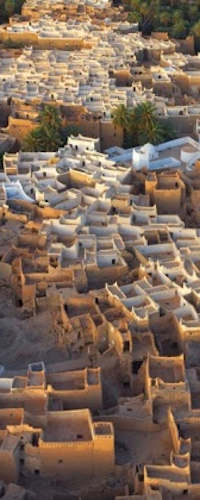
UPDATE: Libyan Museum Suitcase: Ghadames One-day Workshop
The Museum Suitcase “toolkits” have achieved enormous success in spreading cultural heritage awareness in Benghazi, Sabratha, and Tripoli. The project has now expanded to one of the oldest pre-Saharan cities, Ghadames—located in western Libya, at the intersection of the borders of Tunisia, Libya, and Algeria.
Click here for the Arabic version (الحقيبة المتحفيه الليبيه: ورشة غدامس ليوم واحد)
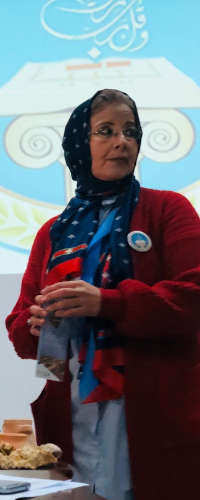
UPDATE: Museums in a Suitcase Foster Understanding in Libya
The Need for “Museums in a suitcase.” Museums play a dynamic role in the community as places of learning and inspiration, and in spreading cultural heritage awareness. In Libya, the rich collections of more than twenty museums around the country have been largely off-limits to the public since the revolution of 2011.
Click here for Arabic version (الحقيبه المتحفيه للترابط و الفهم في ليبيا)
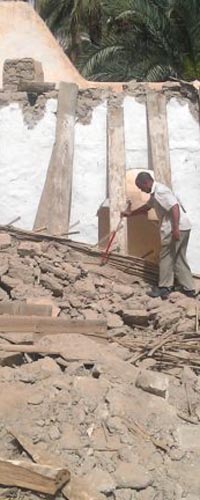
UPDATE: Ghadames
Following a complaint from the Department of Antiquities (DoA) in Ghadames regarding collapses, the DoA in Tripoli dispatched a delegation to the site to document the aftermath of the storms. Members of the archives team in Tripoli documented damage for their internal report, and provided ASOR CHI with photographs of the damage to the Old Town of Ghadames, including collapsed mud-brick structures weakened by rains and lack of maintenance.
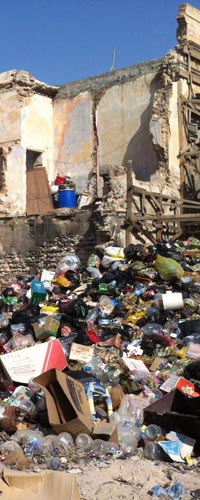
UPDATE: The Old City of Tripoli
ASOR CHI received a comprehensive description of instances of illegal construction in the Old City by a member of the Libyan Department of Antiquities who identified thirteen instances in which historic buildings have been illegally dismantled and, in many cases, replaced by new construction.
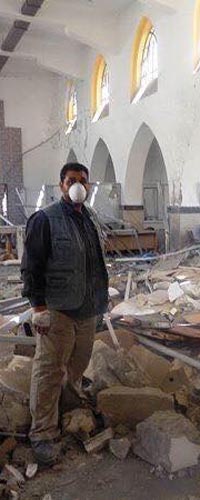
UPDATE: The Old City of Benghazi
After the Libyan National Army (LNA), under the command Field Marshal Khalifa Haftar, liberated the Old City of Benghazi from the Shura Council of Benghazi Revolutionaries on July 5, 2017, civilians have gained increasing access to areas damaged during three years of urban warfare in this part of the city.
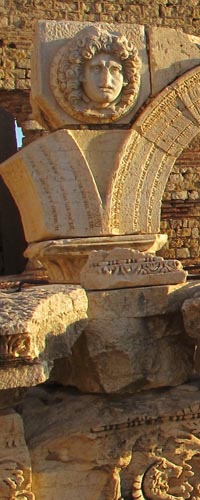
UPDATE: The Status of UNESCO World Heritage Site Leptis Magna
In April 2017, ASOR CHI began covering the ongoing conflict in Libya as part of a new cooperative agreement with the U.S. Department of State. Libya is home to five UNESCO World Heritage Sites as well as a dense concentration of other archaeological sites and historic cities that enrich our understanding of the ways in which humans have lived and thrived in North Africa from the Paleolithic to the present day.
